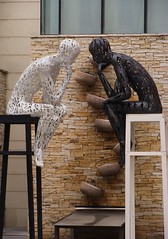 |
| Thinking |
In this final post in
this series, I think it is important to talk about two things: vacuum and use.
This series has given you ways of increasing your library intelligence. Wherever you are in the library and information science field, you need to continue to increase your knowledge of the field. You also need to increase your knowledge of what is happening in other areas.
If your library is expected to react to the world around it, then knowing what is happening around you is important. You cannot live in a vacuum. You cannot make the library your fortress against outside forces. You cannot ignore what is happening out in the community. You must be aware of what is happening and take time to learn about non-LIS things.
Take time to understand what is happening in your larger community - whatever that community might be. What are its issues, concerns, or joys? What is changing or needs to be changed? What's happening with the budget, land use, etc.? What are people protesting and why? Learn this so that when you need the information or a point of reference, you have it. Learn this so if something occurs that requires the library to act, you can do so quickly.
You can learn what's happening outside of the library through interacting with your community and your larger organization. You should also be paying attention to the news sources, which are relevant for your community. While you may be unable to read, listen, or watch everything that is relevant, you can read headlines and table of contents, and then read any articles that seems particularly useful. You might want to attend relevant meetings or information sessions in your community, as a way of learning more about what your community is discussing. Of course, don't forget that social media can help you stay on top of what your community is discussing. Just be sure that you're hearing from multiple sides on an issue.
As for use, this new knowledge which you have garnered is only effective if you utilize it. Be willing to be part of library conversations, whether that is with LIS students, LIS professionals, or members of your larger community. Share what you know about libraries but remember:
- Do not use library jargon. Please don't use library jargon with members of your larger community, because if you use words that they do not understand, they will just stop listening to you. Limit your use of library jargon with other members of the LIS profession, because the breadth of the profession means that we all don't actually understand each other's jargon.
- Listen. The saying is that you have two ears and only one mouth, so you'll listen twice as long as you speak. When you listen, you will actually have a better idea of what you should be talking about. If you're unclear about what you should be saying, ask open ended questions. By the way, some members of our community are rarely listened to. Being willing to listen actively and openly is a wonderful gift.
- Acknowledge that you don't know everything. There will always be topics that you don't understand. If it is a topic that you really do need to know more about, use your library skills to learn about it.
When I started this series, my main focus was on LIS students, but it quickly broadened to other members of the LIS profession. In addition, the topics in this series grew more than I anticipated. I'm sure there is more to say, but I will stop here.
If you have comments, questions, concerns, or ideas, I hope that you will post them as a comment. If you have found this series useful, please comment and tell me why. (I enjoy good news!) And if you know someone who should read this series, please pass it along to them.
Previous posts in this series:
Interested in having Digitization 101 delivered to your inbox? Use the sign-up box on the right side of the blog or use the
box in this post.


